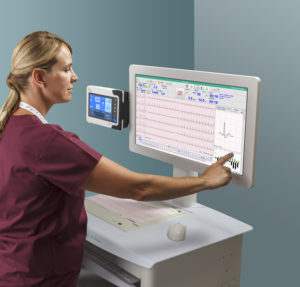Medical device manufacturers do their part to protect their customers
 Researchers have discovered that the three bacteria most commonly found in hospital environments, including two that are resistant to antibiotics, can survive on keyboards and keyboard covers used in clinical areas. 1 Environmental surfaces in the healthcare environment serve as reservoirs for microorganisms that can cause infection in patients and healthcare workers due to cross contamination, and computer keyboards are some of the most dangerous. Research shows that computer keyboards can support bacterial growth for up to 24 hours. 2 When a keyboard is tapped with MRSA, that bacterium spreads to the user’s hands 92 percent of the time. 3
Researchers have discovered that the three bacteria most commonly found in hospital environments, including two that are resistant to antibiotics, can survive on keyboards and keyboard covers used in clinical areas. 1 Environmental surfaces in the healthcare environment serve as reservoirs for microorganisms that can cause infection in patients and healthcare workers due to cross contamination, and computer keyboards are some of the most dangerous. Research shows that computer keyboards can support bacterial growth for up to 24 hours. 2 When a keyboard is tapped with MRSA, that bacterium spreads to the user’s hands 92 percent of the time. 3
Modern-day patient care is administered in a variety of clinical environments. It is therefore reasonable to be concerned about the contamination risks across the entire healthcare network, including hospitals, ambulatory care practices, surgery centers, primary care and other outpatient offices. Reducing cross contamination requires continuous, careful evaluation of everyday clinical procedures. With solution-based product design, medical equipment manufacturers can play an important role in helping reduce the risks posed to caregivers and patients alike. And that’s where we can help!
As a leading developer and manufacturer of innovative medical devices, we strive to deliver high-quality products, while always maintaining the safety of both users and patients as a top priority. In an effort to help combat cross-contamination, we offer a variety of solutions with easy-to-clean work surfaces. Some of our latest offerings include the ELI™ 380 electrocardiograph with glass keyboard; the ELI 280 electrocardiograph with touchscreen interface; Surveyor™ S12 and S19 patient monitors with touchscreen displays; and our new Quinton Q-Stress cardiac stress testing system with touchscreen monitor and optional washable keyboard and mouse. This shift to providing solutions with smooth, easy-to-clean work surfaces versus traditional keyboards and work areas with difficult-to-clean knobs, buttons and crevices demonstrates our commitment to keeping caregivers and patients safe through improved infection control.
With a commitment to the fight against cross-contamination, Mortara is not only considering patient and user safety, but also the wellbeing of the medical facility. There are many ways infection prevention can benefit a hospital or medical office. Mortara’s easy-to-clean, purpose-built products can assist with the following:
- Prevent cost and legal burden from facility-born patient infection.
- Reduce length of patient stay, allowing for increased turnover and revenue. 4
- Improve work conditions and minimize staff sick-time and shortages.
For more information about this important topic, contact your local Mortara rep today at 1-800-231-7437.
- The Texas Department of Insurance, Division of Worker’s Compensation (TDI, DWC) HS05-036B (8-07)
- Nurse Leader Insider, MRSA Can Hide Out in Hospital Keyboards, August 5, 2005, HCPro, Inc. Adapted from Briefings on Infection Control (August 2005).
- Consumer Affairs, Hospital Computer Keyboards Can Spread Germs, Study Finds. Computer Keyboards Can Harbor Dangerous Germs For as Long as 24 hours. April 11, 2015, http://www.consumeraffairs.com/news04/2005/hospital_keyboards.html
- Graves, Nicholas. “Economics of Preventing Hospital Infection.” (April 2004). http://wwwnc.cdc.gov/eid/article/10/4/02-0754_article
- Drumright, Lydia. “Monitoring Major Illness In Health Care Workers and Hospital Staff.” Oxford Journals. http://cid.oxfordjournals.org/content/53/3/284.extract#
- “Worker Safety in your Hospital” Occupational Safety and Health Administration. https://www.osha.gov/dsg/hospitals/documents/1.1_Data_highlights_508.pdf
